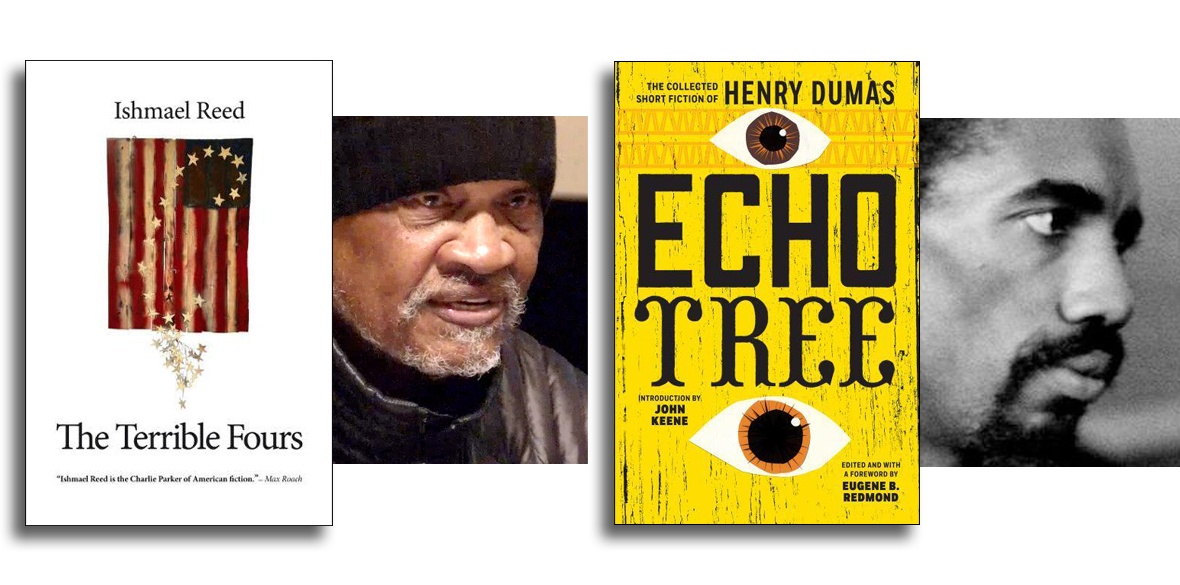This is the last article you can read this month
You can read more article this month
You can read more articles this month
Sorry your limit is up for this month
Reset on:
Please help support the Morning Star by subscribing here
The Terrible Fours
by Ishmael Reed
(Baraka Fiction, £20.95)
Echo Tree: The Collected Short Fiction of Henry Dumas
Edited by Eugene B Redmond
(Coffee House Press, £12)
THE MANNER of Ishmael Reed’s turning US society and its culture upside down and then shaking it onto the floor like the cat litter it can often be never fails to provoke.
Such is the case with Reed’s latest instalment in the series he began publishing in 1999 with The Terrible Twos. Now out is The Terrible Fours, a clever, bitingly sharp and unconventional take on the reality show of the nation Donald Trump both made and undid.
It is not pretty. But it is as funny as Richard Pryor, as sacrilegious as Lenny Bruce and as clever as Mark Twain.
The basic framework of these novels is the consumer society of the US, where instant gratification is a religious duty and Christmas is every day. St Nicholas and Black Peter — the real one and an impostor — zip in and out of the tale.
The wealthy and powerful are played as much as they play on the media-driven stupidity of those who follow the escapades of the rich and famous.
The cast includes a minister of the holy Jesus working for the Devil and cabals of twisted white supremacists conspiring to destroy their mistresses and the surplus population.
There are black men and women working as double agents in the race war the white supremacists don’t want to end.
And there are extraterrestrials in earthly form removed from Earth to their home planet in an event interpreted as the beginning of the Rapture by the servant of Satan in the White House — a servant who thinks he controls the Faustian deal he has made.
While it is possible to read this latest instalment by itself, I recommend the preceding books, the more to appreciate the essence of Reed’s vision.
The stories of Henry Dumas in Echo Tree, whose characters are mostly black and poor, bring the weary Southern landscape alive.
Mostly, they live in the woods and hamlets of the US South and only a few of the stories in a recently published collection of those stories take place outside of this territory.
They are located in the Harlem of the 1950s and 1960s and reflect the disharmony and anger that boiled over during that time.
Dumas, who was murdered by New York Transit Police in 1968 at the age of 38, was often identified with the Black Arts Movement of the period.
The artistry of his words in this collection evoke the steaminess of the Southern summer and the oppression of US racism.
Perhaps his words describing a scene in Harlem before the police attack a crowd express this world best: “Even small children were infected by the malady of hate and boredom.”
Dumas’s prose is aching and absolutely arresting and I was transported into the ecology of relationships between people and the land by these stories.
The odours of the swamp and the fear of the white man with a shotgun became as real as the gulls screeching outside my window.
The human hope shining through a hopeless world of racism and poverty is present: Dumas’s stories are a freedom song and an angry cry, a history lesson and a country walk, a policeman’s club and the crack of a shotgun.
They are a United States of America that has yet to go away. It lingers on in that red, white and blue flag like a wound that will not close and refuses to heal.
This is an edited version of a review that first appeared in Counterpunch (counterpunch.org).











